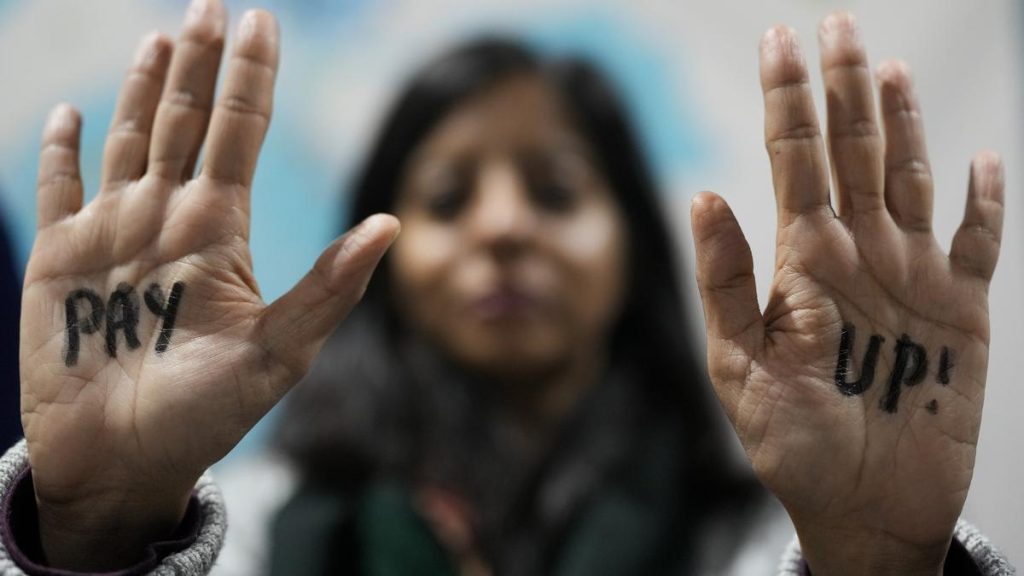
A demonstrator displays hands that read “pay up” during a protest for climate finance at the COP29 U.N. Climate Summit, Nov. 23, 2024, in Baku, Azerbaijan.
| Photo Credit: AP
Bringing justice centre stage requires an alternate sustainability forum
The climate conference in Baku in 2024 turned the climate treaty on its head by scrapping the defining feature of the post-colonial world divided between ‘donors’ and ‘recipients’ and suggesting the need for an alternate global sustainability forum. The shift requires that developing countries take charge of their own destiny.
The purpose of the climate treaty in 1992 was to collectively deal with a common concern. In an unequal world, this was defined by the G7 reducing future emissions of carbon dioxide despite the treaty acknowledging cumulative emissions alone matter. Developing countries agreed to take on a problem they did not create in exchange for technology transfer and funds, not realising that the imbalance in research capacity had set the stage for shifting the burden.
The backbone of the current arrangement is the disconnect between academic treatment and rules and practice, providing continuing advantage to the G7. The way global concerns have been selected, agenda defined, and rules implemented — all the time dealing with the symptoms rather than the causes of problems — provides continuing advantages to the G7. The pressure to provide incentives for private finance and dealing with trade restrictions at the same time was never part of the ‘grand bargain’. The G7 have now absolved themselves of any responsibility for climate change with, in India’s words, the “optical illusion” of providing financial support by 2035.

Two world views
The former colonial powers morphed into the G7 in 1973. Climate change with its reduction in emissions of carbon dioxide is only for the G7 who have overused their fair share of the common atmospheric resource. For the others, the greatest challenge is sustainable development, that is, modifying pathways, lifestyles and energy transition. The way the agenda was set masks the injustice within the climate crisis and the extent it is underestimated.
The impact of the Global South, representing four-fifths of the global population and half the GDP, no longer following the lead of the G7 has been felt most significantly in climate change with growing calls for climate justice. The Nationally Determined Contributions of 72 countries explicitly include the concept of a “just transition”, reflecting recognition of the social dimensions of climate action.
Climate justice is not about perceptions of fairness of specific policies. It questions the framing of existing distinctions between global and local levels and between mitigation and adaptation. It is not just the disproportionate continuing levels of emissions but also solutions such as carbon pricing and trade restrictions that widen the income gap and increase inequality. Current global rules do not reflect the interests of the Global South.
These views reflect conflicting visions of how society is organised and what constitutes progress. Distinguishing between total emissions of countries and trends, drivers, and patterns of natural resource use as causes of climate change masks the impact of the most stable global trend of urbanisation covering three-quarters of global emissions and natural resource use. A middle class and more equal world is adopting opinions, pathways, and actions distinct from those who developed earlier.
The foundational fact is that patterns of urban natural resource use of the G7 are not being followed by the Global South. The G7 with one-fifth the population was consuming three-quarters of global resources in 1950, with the U.S. alone consuming 40%. By the 1970s, three-quarters of the population of the G7 had shifted to cities and their lifestyles based on commodity prices kept low by the former colonial powers directly led to climate change. The real price of the most traded commodity, oil, was not allowed to increase over a century, leading to its wasteful use. In 2050, the G7 will account for 25% of global emissions with a 10% share of the global population, while Asia is expected to account for 55% of the world’s emissions equal to its share of the global population.
The time is ripe for new foundational principles of sustainability with justice at its centre. India would have to match the strategic thinking of the U.S. in setting up interlinked voluntary arrangements of the ‘rules-based order’, with the rules determined by the G7, for a new order for ‘shared prosperity’ seeking comparable levels of well-being within ecological limits.
Global governance
With global cooperation itself in danger, three initiatives are suggested. First, BRICS and partner countries should take the strategic leap for an alternate sustainability forum to support each other in the urban energy transition. This would not be an anti-G7 forum, but focused on units located in member countries in different continents researching sustainability science, urbanisation, monitoring G7 climate policy and supporting exchange of experiences.
Second, the UN Climate negotiations should be limited to reviewing emissions reductions in the G7 and grants in the $300 billion to the most vulnerable — Small Island States and Least Developed Countries.
Third, international fora should be seen as what they are: annual stocktaking that helps the world assess its position and decide course-correction accordingly. The World Trade Organization with its dysfunctional dispute settlement could also be allowed to wither away.
The BRICS playing a bridging role in the new multilateralism will entitle them to their rightful place in the UN Security Council.
Mukul Sanwal is a Former U.N. diplomat.
Published – January 07, 2025 12:41 am IST







